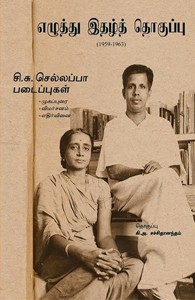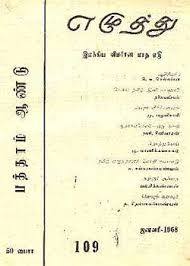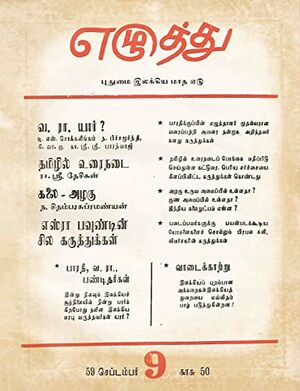Ezhuthu (Magazine)
இந்தப் பக்கத்தை தமிழில் வாசிக்க: எழுத்து
Ezhuthu (1959 - 1970) was an independent literary magazine (Sittrithazh) started by Si.Su. Chellappa. This magazine was started mainly for the purpose of Literary Criticism, but it laid foundation and growth of Tamil Modern Poetry. Ezhuthu led to the emergence of a Literary Movement called Ezhuthu Kavithai Iyakkam[1]'. Some of the important modern poets who became well known in Tamil were identified through Ezhuthu magazine.
History
After the stoppage of Manikodi magazine, Manikodi writers wrote in various independent magazines like Kalamogini, Kalaimagal, Thanee etc. Si.Su. Chellappa, who belonged to the Manikodi group, moved away from them and showed interest in studying the principles of literary criticism in depth. Si.Su. Chellappa worked in Dinamani till 1953, later starting Ezhuthu magazine exclusively for literary criticism. In January 1959, it came out with the announcement Puthumai Ilakkiya Matha Edu[2]', price Naya Paisa 50. Si.Su. Chellappa had mentioned in the editorial of the first issue that "Just as Ezhuthu is a platform for different opinions regarding literary appreciation, it also gives place to new experiments in literature". In the beginning K.N. Subramaniam was the main contributor and mentor of the magazine. K.N. Subramaniam's magazine 'Chandrothayam' set the precedent for Si.Su. Chellappa.
Disagreeing with the path of Ezhuthu, K.N. Subramaniam initially withdrew from it. Later Sundara Ramaswamy and Pramil parted ways with it. Venkat Saminathan became the final one to quit. Over time, the quality of Ezhuthu declined with no one to write for it. Economic crises also increased, from the tenth year onwards Ezhuthu transformed into a quarterly. In its twelfth year, in 1970, the journal ceased publication with issue 119. From 1959 to 1970, Si.Su. Chellappa published a total of 119 magazines. In 1968, 112 issues were published in Ezhuthu as monthly. Later it became a quarterly magazine. Ezhuthu magazine saw it's final publication on January - March of 1970, which happened to be its 119th magazine.
Contents
On the first edition of Ezhuthu, it contained the editorial message from Si.Su. Chellappa (Ezhuthu Valara) along with the works of K.N. Subramaniam (Sahitya Academy Tamil Prize), Pettikadai Naranan Kavithai (Na. Pichamurthy Poem), Mayan Poems, M.V.V. Kathaigal (T. Janakiraman).
Si.Su. Chellappa wrote extensively about the fictional works of of P.R. Rajam Iyer, P.S. Ramaiah, Ku.Pa. Rajagopalan, La.Sa. Ramamirtham in his own analytical style in Ezhuthu magazine. Venkat Saminathan started his literary criticism by writing reader's letters in the Ezhuthu magazine. Pramil also wrote extensive critical articles on people like Mouni in the magazine.
But Ezhuthu magazine started the modern poetry movement from its second issue. Early poets of modern poetry Na. Pichamurthy, K.N. Subramaniam along with other poets like Thi.So. Venugopalan, Nagulan, Sundara Ramaswamy (Pasuvaiiya), C. Mani, Pramil, S. Vaideeswaran were introduced through Ezhuthu magazine. Long poems like Na. Pichamoorty's 'Vazhithunai', C. Mani's 'Naragam', 'Varum Pogum', Pachaiyam' came out in Ezhuthu magazine. Their poetic language and vision were unique. In order to encourage modern poetry in Tamil, the author continued to publish Western poems and poetics. Ezhuthu also created debates about modern poetry.
Ezhuthu created and dedicated it's 5th edition in the memory of Ku.Pa.Ra and its 7th edition in the memory of Pudumaipithan. Ezhuthu also released special editions to honor Na. Pichamurthy's 60 years of age (Mani Vizha) along with an edition on P.S. Ramaiah . The 117th issue of the Ezhuthu was published as a tribute to Sangu Subramaniam.
Challenges
'No more than 2000 copies will be printed and will be available only to those who subscribe in person Si.Su. Chellappa imposed two conditions in the first issue of Ezhuthu. He announced several offers to recruit subscribers and arranged for it to be sold through agents. A full-page cinema ad appeared in the very first issue of the magazine.
Si.Su. Chellappa tried to bring modern literature at the college and university level by Ezhuthu magazine. Ezhuthu became a textbook in Madurai University due to the efforts of C. Kanakasabapathy. A review was written on Si.Su. Chellappa saying that he had made some 'compromises' for this. When the collection of poetry 'Pudukuralgal[3]' compiled by Si.Su. Chellappa was included in the Madurai University syllabus, some of the poems including Sundara Ramaswamy's Mesthirigal' were removed from the collection. These Poems were critical of college scholars. Fellow independent magazines teased it as a 'sanitized collection for university students'. Rajamarthandan feels that he did it as an attempt to bring modern literature to a wider readership. Ezhuthu was constantly struggling to solicit subscriptions from its readers and mandates from libraries. Eventually Si.Su. Chellappa had to stop the magazine.
Literary Significance
Ezhuthu is said to be the first magazine published in Tamil with the definition Sittrithazh. Si.Su. Chellappa came up with the idea under the influence of magazines like 'Encounter', which belonged to the American independent magazine movement. Ezhuthu predetermined its readership and the number of readers. Nothing was published to attract wider readership. It was aimed only at literature.
Contributions to Ezhuthu magazine fall into three categories,
- Ezhuthu created and established the Tamil modern poetry movement. This is known as the Ezhuthu Kavithai Iyakkam.
- Ezhuthu created analytical criticism underpinning American innovators in literary criticism in Tamil
- Ezhuthu has led to some serious literary debates in Tamil. It introduced critical writings by Venkat Saminathan, Pramil etc. Later they formed different factions and thoughts from Ezhuthu.
References
- Ezhuthu muthal 'Kollipavai' varai - Rajamarthandan
- Tamil Sittrithazh Marabin Kaaviya Nayagan Si.Su. Chellappa
- Ezhuthu - Si.Su. Chellappa pdf
✅Finalised Page



